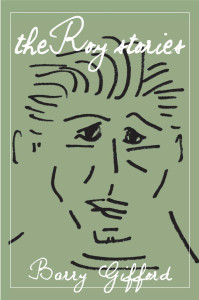Barry Gifford
(Seven Stories Press)

Most of the stories involve Roy, as a kid, 10, 12 years old ... as old as 18. He lives in Chicago, New Orleans, Florida, and his father is an operator, and we're not talking telephones or doctors here. Rather, he's always stepping outside or inside or aside to talk "business" with his friends, driving to their place, leaving Roy in the car, or in a café somewhere, complete with five or ten dollars: telling him he'll be back soon. Sometimes he comes back later, sometimes he never gets back at all, once leaving Roy alone, waiting in the movie theatre. He often tells the boy that he'll come to school to watch his basketball game but he never seems to make it.
He's that kind of father: not bad, just never there. And after he dies Roy's mother begins to do the same thing. She takes up with other men, sometimes men who just appear out of nowhere. Most of them don't get along with Roy, and sometimes (between one just left, another not in place yet) Roy will work extra hard at the Red Hot Ranch where he works three days a week after school hoping to make enough money to keep Mom from taking up with yet another guy.
She will disappear and then reappear just as suddenly. "Through the front window he saw a white Cadillac pull up to the curb. His mother got out of the passenger side. She was dressed up to the nines, wearing a black cocktail dress beneath an ermine stole."
- "Roy, darling," said his mother, "I'm glad I caught you."
She bent a little to kiss him but barely brushed her maroon mouth against his left cheek so as not to smear her lipstick.
Gifford is a master of the Dry American Direct school of writing, one that we've learned from other writers from Chicago: Algren, Ellison, Richard Wright, Hemingway. Gifford must also have studied The New Yorker in his youth, for his why-don't-we-just-stop-here endings made popular by the writers (and editors) of that magazine.
Although many of these stories are not what you would call gripping --- they're too truncated for that --- they do have a constancy, and a competence. You are there, in Chicago in the late 1950s, early 1960s, mostly winter: it is usually cold, snowy, icy, dark, wet, blowy. The streets are raw, and filled with characters with names like Double Trouble Korzienowski, Gin Bottle Sam, Demetrious Atlas (just in from New York) ... and a jokey friend of Roy's uncle's named "Chino:"
- "Know why I'm called Chino?" he asked Roy.
"No, why?"
"'Cause my grandmother had a little yen."
Too, there's Large Jensen, Small Eddie Small, Lonely Johnny, Stuffy Foster (who drowned while doing basic training in South Carolina), Woody Crow (who "drove a tank over a cliff while on maneuvers in Düsseldorf and broke his neck") and The Pharaoh from Cairo, Ill.
The Pharaoh has one leg, regularly shoots pool at Lucky's El Paso poolhall, and could line up four balls "at one end of the felt, hit them one after the other only just hard enough off the rail so that they came back to exactly the same spot at which he'd placed them."
There are so many characters here --- each with his story to tell --- that you may feel like you've fallen into Damon Runyon territory ... only I found Gifford to be a bit more interesting. He's not just telling funny stories about funny eccentrics on Western Avenue, or weirdos down State Street, or odd-balls on Washtenaw, or Chick Ceccarelli who "fell to his death from a balcony on the tenth floor of an apartment building on Marine Drive" ("he was trying to walk on the top of the railing when he lost his balance.") Sometimes, though, the characters take over the story, drown us in details ... such as being told that "the apartment belonged to Loretta Vamp's mother's third husband Dominic Nequizia, who had been Jib Bufera's lawyer."
No matter. We have a link in it all, the necessary innocent anchor: Salinger's Esmé, Sherwood Anderson's George Willard, Bellow's Augie March. Here it's Roy, who comes across as your typical normal straight-arrow, a somewhat shy but often assured youngster of 1955, 1957 or 1962, living in Chicago with his mother, never really knowing his father, putting up with her continuous parade, most of whom drive him nuts (before they end up doing the same to her).
For instance, there's Sid "Spanky" Wade, a jazz drummer (he "spanks" the drums) who damn near drowns in the bathtub. "He had been smoking marijuana, fallen asleep and gone under. Roy's mother heard him splashing and coughing, went into the bathroom and tried to pull Spanky out of the tub, but he was too heavy for her to lift by herself." She calls Roy, and
- Roy and his mother managed to drag Spanky over the side and onto the floor, where he lay puking and gagging. Roy saw the remains of the reefer floating in the tub. Spanky was short and stout. Lying there on the bathroom floor, to Roy he resembled a big red hog, the kind of animal Louie Pinna had shoved into an industrial sausage maker.
"Roy began to laugh. He tried to stop but he could not. His mother shouted at him. Roy looked at her. She kept shouting,. Suddenly, he could no longer hear or see anything."
And that's how "Bad Things Wrong" ends, like so many of these --- they just up and end like that, as if Gifford had gotten lost or something, or just quit typing, no matter how interesting the story is getting to be. So then we find ourselves out of one and plop! into the next.
 One never worries, though. These are like eating Fritos or Oreos or Doritos, or better, a great hot dog on the streets of Chicago, with just the right condiments. And it's impossible to stop. Stories like "The Vanished Gardens of Córdoba" just --- bang --- begin in the middle, then go away; and then we move on ... and it's O.K..
One never worries, though. These are like eating Fritos or Oreos or Doritos, or better, a great hot dog on the streets of Chicago, with just the right condiments. And it's impossible to stop. Stories like "The Vanished Gardens of Córdoba" just --- bang --- begin in the middle, then go away; and then we move on ... and it's O.K..
Some are jewels, though. Forget the title of "Close Encounters of the Right Kind" --- wrong decade --- which is about Fatima Bodanski, who had the reputation of being a "fast girl," and Roy falls in love with in an instant. Or try "Blue People," about the Tuaregs and their dyed clothing. Or Roy visiting his old friend Eddie Derwood, committed to Illiniwek Psychiatric Institute. When he comes into the room, Eddie doesn't seem to see him. "His eyes were foggy and the corners of his mouth had white crust on them."
- "It's me, Roy. Don't you recognize me?"
Eddie stared at Roy for thirty seconds before saying, "You're just a bird, a big, dark bird without wings."
Roy asks the attendant if he is on drugs. "You don't know that" say the attendant. The attendant says to Eddie, "You need somethin', Mr. Derwood. "Caw! Caw!" said Eddie. "Visit's over," said the attendant.
- The only time Roy could remember Eddie Derwood losing his temper was once when they were fifteen at Eddie's house and his mother told Eddie that he was not as smart as his older brother, Burton. Eddie sprang from his chair like a leopard catapulting out of a tree onto an unsuspecting passing animal and grabbed his mother with both hands around her throat pinning her against a wall.
"Eddie held her there for several seconds before letting go. He did not say a word and neither did his mother. Eddie sat down and his mother left the room. Roy did not go back to Eddie's house again for a long time after that."